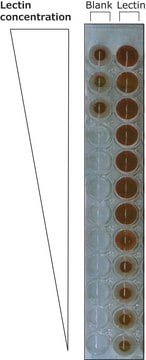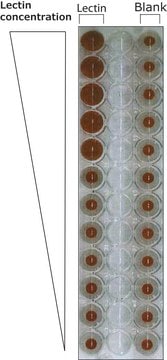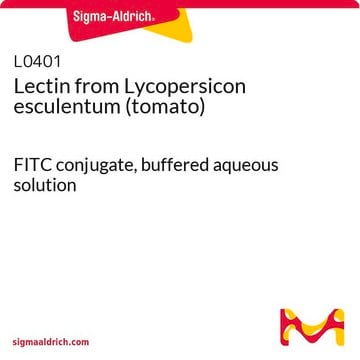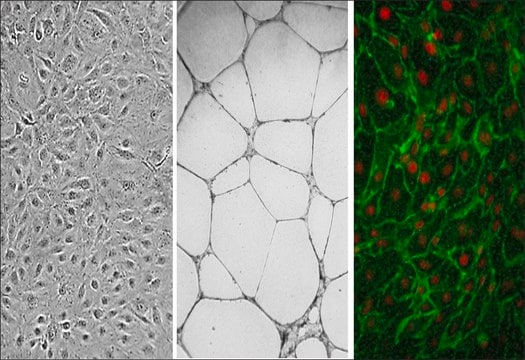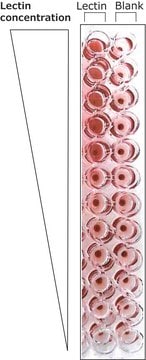L9006
Lectin from Ulex europaeus (gorse, furze)
FITC conjugate, lyophilized powder
Synonym(s):
Ulex europaeus agglutinin, UEA-I
Sign Into View Organizational & Contract Pricing
All Photos(1)
About This Item
UNSPSC Code:
12352202
NACRES:
NA.32
Recommended Products
conjugate
FITC conjugate
Quality Level
form
lyophilized powder
potency
<5 μg/mL agglutination activity
composition
Protein, ~10% Lowry
extent of labeling
2-5 mol FITC per mol protein
storage temp.
−20°C
Looking for similar products? Visit Product Comparison Guide
Related Categories
Biochem/physiol Actions
Ulex europaeus agglutinin has anti-H blood group specificity. There are two types of lectin: UEA I has an affinity for L-fucose and UEA II has an affinity for N,N′-diacetylchitobiose. The mol. wt. of UEA I was initially found to be 170,000 daltons. Later reports indicate that UEA I may form aggregates at neutral and basic pH and that the correct mol. wt. is 68,000 daltons.
Packaging
Package size based on protein content.
Linkage
Conjugates are prepared from affinity purified lectin.
Physical form
Contains potassium phosphate buffer salts and NaCl
Analysis Note
Agglutination activity is expressed in μg/ml and is determined from serial dilutions in phosphate buffered saline, pH 6.8, of a 1 mg/ml solution. This activity is the lowest concentration to agglutinate a 2% suspension of human blood group O erythrocytes after 1 hour incubation at 25 °C.
Storage Class Code
11 - Combustible Solids
WGK
WGK 3
Flash Point(F)
Not applicable
Flash Point(C)
Not applicable
Personal Protective Equipment
dust mask type N95 (US), Eyeshields, Gloves
Certificates of Analysis (COA)
Search for Certificates of Analysis (COA) by entering the products Lot/Batch Number. Lot and Batch Numbers can be found on a product’s label following the words ‘Lot’ or ‘Batch’.
Already Own This Product?
Find documentation for the products that you have recently purchased in the Document Library.
Customers Also Viewed
Naoki Akanuma et al.
Pancreas, 46(9), 1202-1207 (2017-09-14)
We aimed to evaluate the contribution of acinar-to-ductal metaplasia (ADM) to the accumulation of cells with a ductal phenotype in cultured human exocrine pancreatic tissues and reveal the underlying mechanism. We sorted and cultured viable cell populations in human exocrine
Karla Lehle et al.
Artificial organs, 40(6), 577-585 (2015-10-30)
Multipotent progenitor cells were mobilized during pediatric extracorporeal membrane oxygenation (ECMO). We hypothesize that these cells also adhered onto polymethylpentene (PMP) fibers within the membrane oxygenator (MO) during adult ECMO support. Mononuclear cells were removed from the surface of explanted
Fenlong Xue et al.
Cell and tissue banking (2021-05-31)
The release of paracrine factors from endothelial progenitor cell (EPC) sheet is a central mechanism of tissue repair. The purpose of this study was to constuct the rat bone marrow derived-endothelial progenitor cell (BM-EPCs) sheet and investigate invest the role
Johanna M Seddon et al.
JAMA ophthalmology, 134(11), 1272-1280 (2016-09-23)
Age-related macular degeneration (AMD) is a multifactorial disease with genetic and environmental factors contributing to risk. Histopathologic changes underlying AMD are not fully understood, particularly the relationship between choriocapillaris (CC) dysfunction and phenotypic variability of this disease. To examine histopathologic
Zoe E Clayton et al.
International journal of cardiology, 234, 81-89 (2017-02-18)
Endothelial cells derived from human induced pluripotent stem cells (iPSC-ECs) promote angiogenesis, and more recently induced endothelial cells (iECs) have been generated via fibroblast trans-differentiation. These cell types have potential as treatments for peripheral arterial disease (PAD). However, it is
Our team of scientists has experience in all areas of research including Life Science, Material Science, Chemical Synthesis, Chromatography, Analytical and many others.
Contact Technical Service




